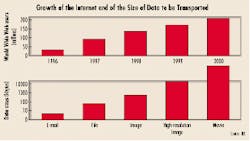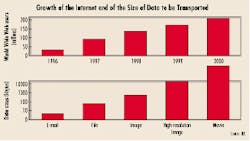IEC predicts Internet protocol will become the core technology for global communications
Internet-protocol (IP) networks have begun to dominate the communications scene, whether existing as a protocol operating over local, wide-area, wireless, mobile, and satellite networks, or over leased lines as routed networks. According to a new report by the International Engineering Consortium (IEC--Chicago), the prevalence of business and residential usage of packet networks has convinced carriers to begin converting their national networks to packet format, either as pure IP or packet-over-Asynchronous Transfer Mode (ATM) cell-based networks.
The report cites Internet 2, a cooperative venture between the nation's universities, government agencies, and corporate partners from the information industry as a major contributor to advancing IP technology. According to The Future of IP and Packet Networking: 2000-2010, the goal of Internet 2 was to develop a new family of advanced applications designed to meet emerging needs, primarily to address the bandwidth needs of academia and the nation's research community.According to IEC's report, the project has progressed well enough that Internet 2 is expected to become the standard for the research and business communities by 2010.
The report makes a case that Internet 2 will be the solution to the challenge of upgrading the entire Internet, both public and private, to a higher bandwidth that will not only support higher speeds, but also an entirely new realm of highly demanding video and multimedia applications.
The report concludes that IP and packet networking is flourishing and will increasingly be the basis for voice, data, video, and multimedia delivery over the complete range of networks in the United States, as well as a core technology for global communications.
The report is available from the IEC by calling Julie Brandt at (312) 559-3730, e-mail: [email protected], or visiting the Website at www.iec.org/pubs.

